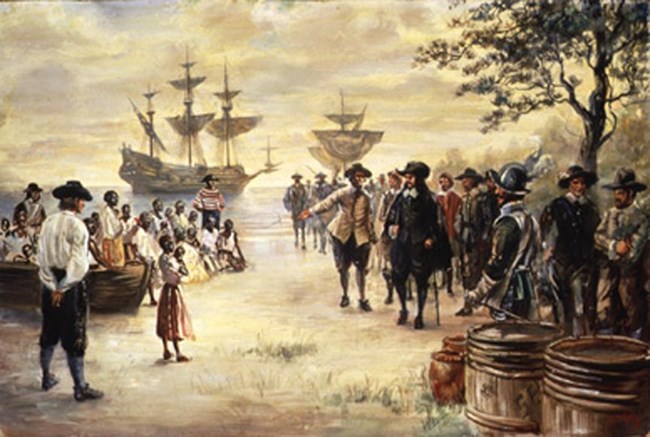| 1619 |
Arrival of "20 and odd" Africans in late August 1619, not aboard a Dutch ship as reported by John Rolfe, but an English warship, White Lion, sailing with a letters of marque issued to the English Captain Jope by the Protestant Dutch Prince Maurice, son of William of Orange. A letters of marque legally permitted the White Lion to sail as a privateer attacking any Spanish or Portuguese ships it encountered. The 20 and odd Africans were captives removed from the Portuguese slave ship, San Juan Bautista, following an encounter the ship had with the White Lion and her consort, the Treasurer, another English ship, while attempting to deliver its African prisoners to Mexico. Rolfe's reporting the White Lion as a Dutch warship was a clever ruse to transfer blame away from the English for piracy of the slave ship to the Dutch. |
| 1630s |
Indication by surviving wills, inventories, deeds and other documents that in some instances it was considered "customary practice to hold some [Africans] in a form of life service." It should be noted that by examining these documents it was also found that some blacks were able to hold on to their status of being indentured servants, thus, eventually gaining their freedom. |
| 1639 |
All persons except those of African descent are to be with Arms and Ammunition. |
| 1640 |
John Punch, a runaway indentured Servant, first documented slave for life. |
| 1662 |
Slavery was recognized in the statutory law of the colony.
Legislation was passed defining the status of mulatto children. Children would be considered the same status as the mother. If the child was born to an enslaved person, the child would be considered enslaved. |
| 1667 |
Baptism does not bring freedom. Until the General Assembly outlawed it, baptism could be the grounds for a black slave to obtain his/her freedom. It was considered for a period of time that it was not proper for a Christian to enslave a fellow Christian. |
| 1670 |
Blacks or Indians could no longer own white indentured servants. |
| 1680 |
An act was passed preventing insurrections among slaves.
Blacks could not congregate in large numbers for supposed funeral or feasts. Blacks must also obtain written authorization to leave a plantation at any given time. They could not remain at another plantation longer than four hours. |
| 1691 |
First act prohibiting intermarriage.
No person of African descent or Mulatto may be set free by any person unless the pay for the transportation out of the colony within six months or forfeit ten pounds of sterling so that the church wardens might have the person transported. |
| 1692 |
People of African descent must give up ownership of horses, cattle or hogs.
Separate courts for the trial of slaves charged with a capital crime, thus depriving them of the right of a trial by jury. |
| 1700's |
Slaves composed half of Virginia's unfree labor force. |
| 1705 |
Slave laws were codified. |
SUGGESTED FOR FURTHER READING
Billings, Warren M. Ed. The Old Dominion in the Seventeenth Century - A Documentary History of Virginia, 1606-1689. University of North Carolina Press, 1975
Breen, T.H., and Innes, S. "Myne Owne Ground" - Race and Freedom on Virginia's Eastern Shore, 1640-1676. New York: Oxford University Press: 1980
Craven, Wesley F. White, Red and Black: The Seventeenth Century Virginian, Charlottesville, 1961.
Hening, William W. Ed. The Statues at Large: Being a Collection of all Laws of Virginia, from the first session of the Legislature in the year 1619. 13 Volumes Richmond, New York and Philadelphia, 1809-1823.
Hughes, Sarah and Zeigler, J. Jamestown's Other People, Children's Program Teachers Manual, , Colonial National Historical Park, 1976.
McCartney, Martha W., A Study of the Africans and African Americans on Jamestown Island and at Green Spring, 1619-1803, National Park Service and Colonial Williamsburg Foundation, Williamsburg, Virginia, 2003.
McLLwaine, H.R. Minutes of the Council and general Court of Colonial Virginia, 1622-1632, 1670-1676, with notes and excerpts from the original Council and General Court records, Now Lost. Richmond, Virginia1924.
Russell, John H. The Free Negro Property Owner in Virginia, 1619-1865. (Out of Print)
Vaughan, Alden T. "Blacks in Virginia: A Note on the First Decade" The William and Mary Quarterly, XXIX, July 1972.

